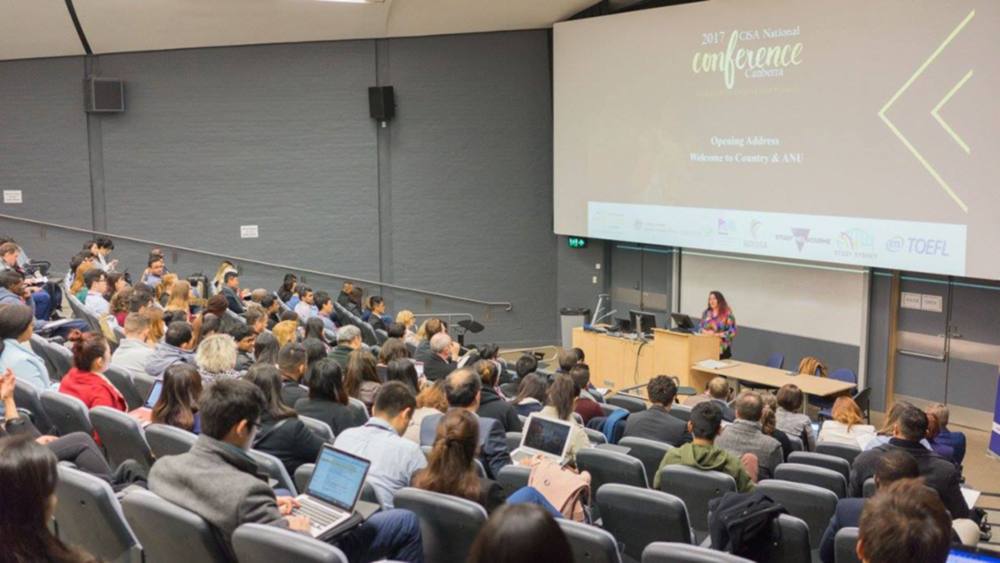CISA National Conference 2017: Day 1 – Students at the Heart of Best Practices
Student delegates and industry members from across the country once again converged at the Council of International Students Australia (CISA)’s National Conference, this year taking place in Canberra at the Australian National University.
CISA’s theme for its conference this year, ‘Students at the Heart of Best Practices’, aimed to highlight all the ways in which key parties within the international education sector could better serve and engage with the very students that affected their industry.
At day one of the conference, the peak body for international students encouraged cross-communication between attending student delegates and professionals in the sector. By doing so, every facet of the industry could learn from one another and bring home a part of that conversation to help grow their own practices.
With optimism in the air, student delegates heard from industry, government and community speakers (including fellow international students) on ways to tackle the many issues affecting the community.
Key issues of the conference
Although overall student experience remained a key factor in determining student welfare, inter-cultural engagement between domestic and international students was also focused on. As speakers at the conference explained, the more international students engaged with friends from the same country, the likelier it would be that their English language skills would decline.
Despite these concerns, Dr John Wellard, Policy Director (International) of Universities Australia said, “There is no better time than now to be a student in Australia”.
Dr Wellard also pointed out that international students were increasingly being given a voice and now have more avenues to facilitate conversations on issues around the community.
To counter Dr Wellard, a student in the audience spoke about her own experiences as a student leader, revealing how difficult it was for her to speak to her Vice-Chancellor. She further pontificated on how impossible it might be for the thousands of vulnerable international students unable to speak up themselves.
The importance of student services was also spotlighted by National President of ISANA International Education Association Mary Ann Seo, who raised concerns about international students not knowing the full services available to them. She concluded that part of the problem came down to students missing orientation, or parts of it, due to reasons beyond their control (flights, administrative enrolment problems, etc).
Discussions around university budget cuts also took place, though no solutions could be found. Ms Seow urged students to take charge, find out where their student amenity payments were going and encouraged students to utilise data to instigate change — never hesitating to remind attendees of their economic importance to Australia.
Accommodation and overcrowding was also a concern, especially with Victorian students, as international student enrolments continue to rise. The exploitation of international students in the workplace, a topic hotly covered in previous conferences, was also acknowledged.
Legal rights of international students
Another major focus of the conference was centered around the legal rights of international students.
“We’re going to hear from many people over the course of this conference who will say a majority of international students have a great time once they study in Australia and I think that’s reasonably accurate but there will be students who will not,” Solicitor Sean Stimson from the Redfern Legal Centre in New South Wales said.
Mr Stimson spoke about the Redfern Legal Centre’s efforts to raise awareness of their free services to international students but admitted that doing so had proved difficult.
The biggest hurdle, he admitted, was helping students understand their rights. Most did not want to learn until they were involved in an altercation or had difficulties understanding due to language barriers.
Additionally, Mr Stimson and the centre came to the realisation that while their services were helpful, student feedback indicated that issues weren’t resolved and that a metaphorical band-aid was used as a temporary solution in many cases. He believed that change needed to come from law reforms to avoid legislation conflict.
Meanwhile, Inner Melbourne Community Centre Senior Lawyer, Nadia Morales identified other parts of the law outside of workplace exploitation there were pertinent to the international student community. These included sexual assault, family violence, transportation and immigration.
Ms Morales further acknowledged that more attention needed to be given to VET, ELICOS, RTO and Foundation Studies students and indicated that although these students were among the most vulnerable within the international student community, they don’t receive the same support otherwise available to university students.
Both centres also revealed plans to develop apps within their organisations to help international students better understand the law in their respective states.
Sexual harassment and assault
“People in Australia, in particular, seem to understand absolutely what constitutes as sexual assault but when it comes to sexual harassment things are a little unclear,” said Universities Australia’s Policy Director of Strategic Initiatives, Dr Renee Hamilton who was present at the conference to talk about her organisation’s ‘Respect. Now. Always.’ campaign.
Dr Hamilton announced that as part of the campaign, which ensures that Australia’s universities are places of safety and respect, the Australian Human Rights Commission and all 39 universities will release the results of its anticipated nationwide survey inquiring into university students’ experiences with sexual assault and harassment on campus grounds (investigated by the Australian Human Rights Commission) on August 1.
Additionally, Dr Hamilton spoke about how men were beginning to report their experiences with sexual harassment and assault and encouraged more to come forward.
Student leaders were vocal in their concerns about the campaign. One student felt that imaging around the campaign reinforced gender stereotypes with its depiction of women as victims and men as perpetrators. Another felt the campaign was too hetero-normative and was not inclusive or representative of students within the LGBTQ+ communities.
Dr Hamilton reassured students by urging societies, communities and individuals to report any instances of sexual harassment or assault taking place on campus.
Stay tuned for our Day 2 coverage of the CISA National Conference 2017.
